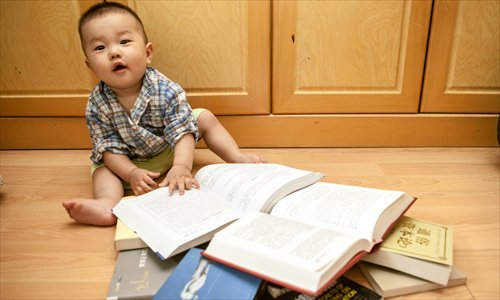HOME >> METRO BEIJING
Make me a genius
By Yin Lu Source:Global Times Published: 2015-6-14 18:08:01
Parents want to know if their child is gifted, but are they pushing too hard?

Educators remind parents who are determined to raise a genius to relax because it can't be forced. Photo: IC
A so-called genius manufacturing plan in Beijing is an urban legend that has been circulating among local parents for quite some time.
This special "recipe" for nurturing a prodigy requires parents to follow these steps closely: Take your 3-year-old to Happy Times Kindergarten in Dongcheng district to prepare for the entrance tests for Beijing Yucai School when they are ready for elementary education. Right when they enter the fourth grade, take them to get tested for Beijing No.8 High School's special prodigy class or The High School Affiliated to Renmin University of China's early cultivation class, or Tsinghua High School's talent class.
Although following every step of this imagined program may prove difficult, many determined parents who believe they have gifted children are making up their minds to go as far as they can until their child fails one of the tests. However true their belief is, these parents want to take their children on the road where a genius is promised to be made, the road they believe that will lead to esteemed universities and a promising future.
However, experts point out that it doesn't always work that way.
Prodigy training
Sunny Song, 34, who works for a State-owned company and is married to an engineer, takes pride in their 8-year-old daughter Mohan, who Song said has inherited their good genes and intelligence and has shown a higher level of achievement than her peers at a very early age.
Last month, Mohan tested into a "supernormal" class of 20 gifted children at an extracurricular academy of 500 students. Song proudly showed Metropolitan dozens of prizes and certificates of merit that her daughter won in math, arts, English language, social science and more.
"My daughter works on five math olympiad problems and 60 mental arithmetic problems every day," Song said. "She has stronger calculation and logical analysis skills compared to other children her age."
She estimates she and her husband pay at least 30,000 yuan ($4,832) each year on such classes and programs outside of the public education system. Song even hires private tutors for her daughter.
Song has an ideal "step-by-step" plan. "The first step is to perform well on the entrance exams and get enrolled in the 'rocket classes' of a famous elementary school," she said.
It tugs at Song's heartstrings when she sees her daughter have too much extracurricular work to do to enjoy a weekend. However, she believes that fostering Mohan's intelligence and talent is more important.
Many Chinese parents, like Song, are concerned about whether or not their children are "geniuses," and attempt to cultivate one by setting tough rules. They are eager for their children to get offered enrollment in one of the small number of "gifted" classes in schools where students get special attention and a different style of education than their peers. There are countless "supernormal academies" or "math olympiad classes" in big cities like Beijing.
"Parents born in the 1980s, unlike the last generation, are usually well educated, so they don't want to fall behind in cultivating their kids' talents and they will spare no efforts in doing so," Song said.

Experts point out that gifted education is essential. Photo: Li Hao/GT
Not a recipe for all
Shi Jiannong, head of the Research Center for Supernormal Children (RCSC), pointed out in recently published research that gifted education is very important and necessary for the country and for the many talented youth.
"Research shows that about 1 percent of children have an IQ higher than 140," Shi said. "Some experts say supernormal children are more than just a small group with high intelligence, and estimate the proportion should be 15 percent or so."
Shi pointed out that having special classes in normal schools is a common method of supernormal education in China.
Among the few schools providing such elite education, Beijing No. 8 High School has the city's first prodigy program that has been running for about 30 years.
In merely five years, the program leads students to finish education materials and gain corresponding abilities of the fifth and sixth grades of elementary school, middle school and high school.
According to its enrollment announcement, 10- or 11-year-old children with fourth grade level of knowledge have to pass three rounds of examinations to test their language, math, memory, logical reasoning, and focus skills. After the process, only 30 out of the thousands of candidates will be lucky enough to enter the program.
Johns Hopkins Center for Talented Youth (CTY) in Maryland, US, has been providing gifted education much like Beijing No.8 High School's prodigy program since 1979, but educators from CTY do not use the term "prodigies" when referring to the students.
"It is more accurate to describe them as 'academically advanced,'" said Maria Blackburn, a communication specialist with CTY. The nonprofit academic center has identified academically talented students in grades 2 to 10 through its annual Talent Search since 1979, and supported their growth with accredited programs.
"We believe that academic talent is not fixed. We know that academically advanced students need to be challenged, supported, and nurtured to reach their full potential," said Blackburn. The center provides students the opportunity to study subjects they may not be exposed to in school or at their particular age, such as physics for 12-year-olds and college-level engineering for high school students.
With a growing awareness of the importance of gifted education, the center enrolls more than 24,000 students a year in its online and offline programs from more than 80 countries worldwide. Between 2010 and 2015, the number of talented students from China registering for CTY programs has grown from 117 students in 2010 to 798 in 2015.
Shi points out in his research that supernormal education caters only to the special needs and characteristics of supernormal children. "Using educational methods to transform a normal child into supernormal one is a good wish, but unscientific, and harmful," he said.
According to Shi, the first problem in China's supernormal education is a lack of specific laws and regulations. "Therefore, some people use parents' eagerness to get 'supernormal education' to make a fortune."
Other problems include a lack of financial investment and a lack of educators that specialize in the area, he said.
Nature or nurture?
Li Shijia, a post-doctoral research fellow from the Medical School of Otto von Guericke University Magdeburg in Germany and a well-known writer on popular Chinese science website guokr.com, has recently learned how eager Chinese parents are to turn their child into a genius.
Li translated and introduced the documentary National Geographic: My Brilliant Brain to Chinese Net users. How readers reacted to the documentary surprised her greatly. Some questioned whether Li was using the article as a hook to publicize a young genius training program, and many have sent messages to her making inquiries about how to educate their children.
"I personally don't believe that the so-called genius programs can create geniuses, and I have never heard about any genius in history that was cultivated this way," she said.
For the frequently asked question - between genes and environment, which affects a child's abilities and performance? And is a genius born a genius or is talent nurtured? - Li explained that, "in most circumstances, interests and talents in certain areas shown in early stages are mostly decided by the genes."
"For example, some people are born with a highly sensitive appreciation of colors, and some are born with superior memory. All those have a basis in your biological make-up," she said.
Therefore, the aim of education is not to limit a child to a certain area, but to find out more about his or her qualities and guide them properly, she said.
However, without fully knowing their own children's interest and talents, some parents force them to learn certain skills, while others train their children in any field they can think of.
Li said parents should be a good judge themselves of their own children's talents, instead of "dumping all the responsibility on schools, teachers or educational institutions."
"I think every parent is obliged to know their child and their talents, but not on the premise of 'my child is a genius.'"
A rare breed
Experts advise parents to stop being obsessed with the idea of having a genius child. Ellen Winner, a professor and chair of the Department of Psychology at Boston College in the US who specializes in developmental psychology of the arts in both typical and gifted children, said parents need to relax.
"It's fine to have a typical child. Only a few are very gifted. Don't push your child too hard," she said.
Winner uses a qualitative system to identify talents. "It is very easy to see with the naked eye, no test needed, if a child is performing in some area years ahead of his/her peers," she said.
According to Winner, real talents are rare. It might seem the word "genius" is more widely used than ever, and the number of children who are called prodigies by their parents, or the community, or the media has been growing in recent years. But researchers point out that this might be because of the influence of the Internet, where information is exchanged more quickly.
According to Winner, the most difficult part of gifted education is that it should be "as advanced as the child needs it to be." "Pull out programs for a few hours a week are just like Band-aids, and not very effective," she said.
Winner said that even if parents have discovered their child is gifted, that doesn't mean the road ahead will be easy.
"Most prodigies do not go on to become geniuses. They become experts. They also sometimes turn to a very different kind of occupation unrelated to the area in which they were prodigious," she said. "Some burn out, especially if pushed too hard by relentless parents."
Posted in: Metro Beijing